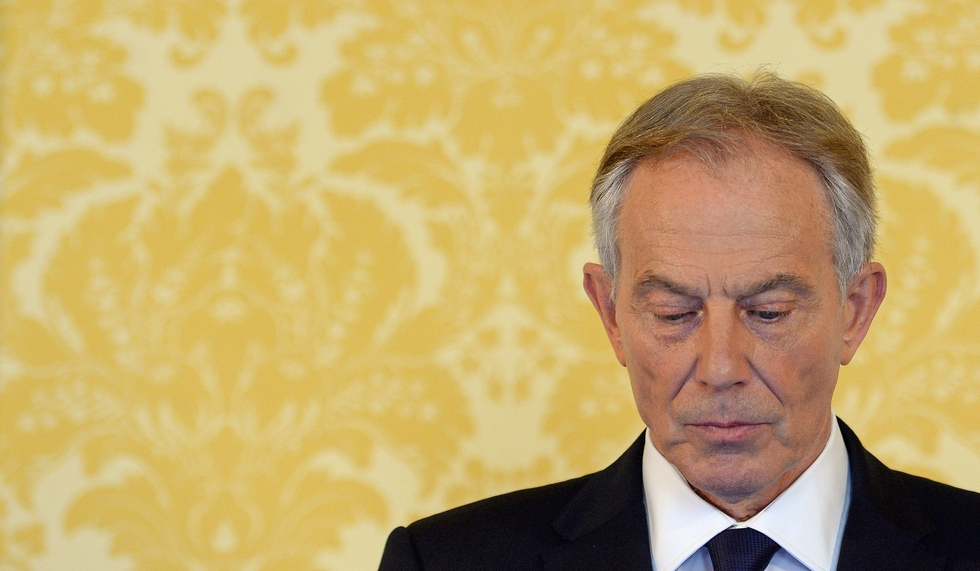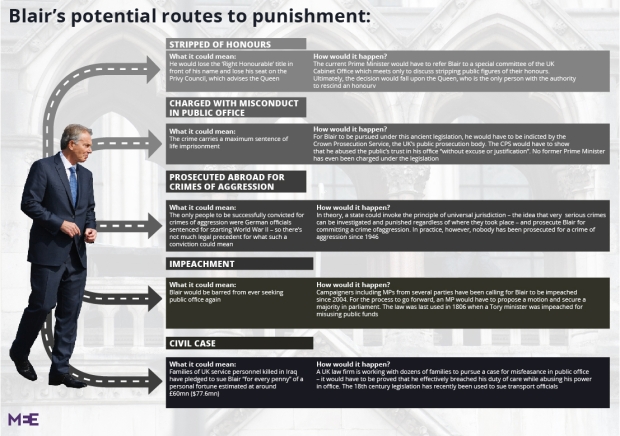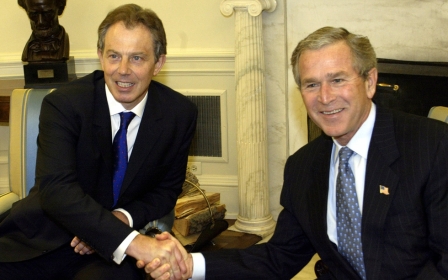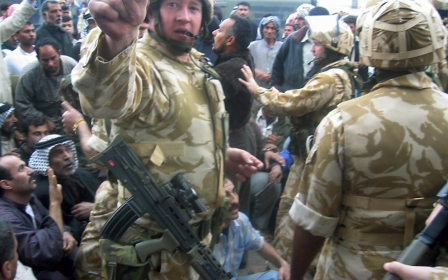Five ways Tony Blair could be punished for Iraq

The long-awaited Chilcot report into the lead-up and execution of the Iraq war – published on Wednesday after a seven-year wait – savaged the politicians responsible for leading the UK’s participation in the invasion, particularly then-prime minister Tony Blair.
The report condemned the rush to war and exposed Blair for committing to support US forces long before British politicians and military leaders were informed, but it didn’t go as far as accusing the former leader of war crimes.
Many anti-war campaigners and relatives of the 179 British troops killed in the campaign still want concrete action against Blair. Many want to see him tried for war crimes – but what does that actually mean, and what national or international legislation could be used to prosecute him for alleged wrongdoings?
The International Criminal Court (ICC), based in The Hague, is the only permanent international body with the authority to prosecute war crimes, genocide and crimes against humanity. However, the court is unable to pursue Blair. Lawyers prosecuting him for war crimes would have to prove that he personally knew about and signed off on atrocities committed on the ground by British troops.
Prosecution for the crime of aggression – which involves a leader committing a country to a war of aggression in violation of the United Nations Charter – may have been possible. But the ICC is only now in the process of acquiring authority to prosecute crimes of aggression and its authority, once it becomes active, cannot be applied retroactively to the invasion of Iraq.
With this in mind, legal experts say only five routes remain that could see Blair face punishment over his role in the Iraq War:
Prosecuted abroad for crimes of aggression
Although the ICC is unable to try alleged crimes of aggression committed in 2003, it is on the statute books of several states. In theory, a state could seek to prosecute Blair for crimes of aggression – otherwise known as crimes against peace – under the principle of universal jurisdiction.
Universal jurisdiction is the idea that some crimes are so severe that any state has the right to prosecute the perpetrators, no matter where the crime was committed. It has previously been invoked by Denmark and Germany to punish crimes against humanity in Bosnia in 1992, and by Belgium and Canada over the 1994 Rwandan genocide. However, says Aurel Sari, senior lecturer in international law at the University of Exeter, it is unlikely that any state will pursue this option. Not only would such a move be politically controversial, but the status of the crime of aggression as an offence subject to universal jurisdiction remains unsettled.
Misconduct in public office
There have been calls for Blair to be charged with misconduct in public office, a criminal charge that dates back to the 13th century. The UK’s former prosecutions chief Ken Macdonald said on Thursday that it was “very likely” Blair’s actions in the lead-up to the war – when he is accused of keeping key information from ministers in his own cabinet – amount to criminal abuse of the public’s trust in him. The crime of misconduct in public office carries a maximum sentence of life imprisonment.
The Crown Prosecution Service (CPS), the UK’s public prosecution body, would have to decide that it was in the public interest to pursue Blair. A probable defence might be that the danger of Saddam Hussein remaining in power meant leaders had reasonable excuse to take the action they did. However, according to Macdonald, evidence uncovered in the Chilcot report proves that this defence is a “busted flush” – a potential winning hand that turns out to be worthless.
Civil claims
Lawyers are currently seeking to pursue Blair in the civil, rather than criminal, courts. This would be for the offence of misfeasance in public office – the civil equivalent of misconduct in public office. Dozens of families of UK service personnel killed in Iraq have pledged to sue Blair “for every penny” of a personal fortune estimated at around £60m ($78m).
For a case to go through, it would have to be proved that he knowingly abused his power while in his office, leading to harm for the claimants. Lawyers representing the families have said that “if state officials are determined to have acted unlawfully or in excess of their powers, then the families will then decide on whether to take any necessary and appropriate action at the proper time”.
Impeachment
Impeachment, a punishment imposed by the UK’s parliament, would see Blair barred from ever seeking public office again. Since 2004, MPs from the Conservative Party – in opposition at the time of the Iraq invasion – have campaigned alongside representatives from the Scottish and Welsh nationalists parties to impeach Blair. Impeachment would mean that a public representative can be punished as the UK Parliament sees fit if they are proved to have committed a crime.
For a case to go forward, a single MP would have to propose a motion supported by evidence to show that Blair did commit a crime, probably one relating to his conduct in the run-up to the invasion. The motion would then have to be passed by a majority in the House of Commons before being approved by the House of Lords. The process works similarly to a criminal trial, but witnesses are called to testify in front of politicians rather than a judge.
The attempt to impeach Blair, though, is a “non-starter,” according to Sari. “The last impeachment case was brought well over 200 years ago – experts working in this area say that the process is obsolete,” he said in reference to a law whose first recorded use was in 1376.
In any event, impeachment would entail a trial for "high crimes and misdemeanours" in the Houses of Parliament. “It is highly unlikely that such a process would be in keeping with human rights law," Sari said.
Stay informed with MEE's newsletters
Sign up to get the latest alerts, insights and analysis, starting with Turkey Unpacked
Middle East Eye delivers independent and unrivalled coverage and analysis of the Middle East, North Africa and beyond. To learn more about republishing this content and the associated fees, please fill out this form. More about MEE can be found here.





